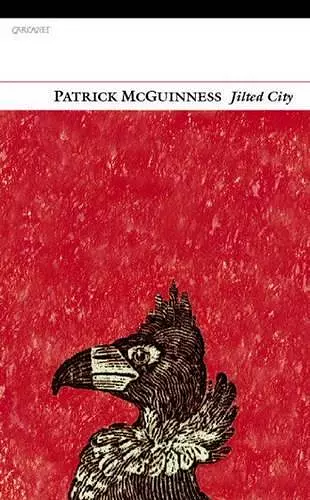Jilted City
Format:Paperback
Publisher:Carcanet Press Ltd
Published:28th Mar '10
Should be back in stock very soon

The poems in Jilted City inhabit in-between-places, when a border is being crossed, a word is slipping into another language, when memory is translating loss. From ‘Stations where the train doesn’t stop’ in ‘Blue Guide’, following a train journey through Belgium, to ‘City of Lost Walks’, English versions of a dissident Romanian poet whose ‘poetry fails to register except in the form of an omission’, McGuinness explores transition and translation, the afterlife of absences. Wit and paradox are at the heart of a collection that finds unforeseen connections between place and displacement.
'Running through Jilted City is an acrid tenderness that is entirely itself, its jokes dry, aching with loss.' – George Szirtes
Cover image: Alun Hemming, Urban Vulture. Reproduced by kind permission of the artist. Cover design StephenRaw.com
'Patrick McGuinness has constructed a rough guide to a lonely planet, full of unquenchable cultural curiosity and irresistible ironies... Alive to every undulation of the linguistic landscapes in which he moves, McGuinness’s poems often pivot on the cross-cultural possibilities of a single isolated word.'
New Welsh Review
All at sea and off the rails
Tunisian-born Patrick McGuinness, who lectures in French at Oxford, is preoccupied by departures in his collection Jilted City.Railway stations recur as places where a life might go forwards or backwards.In 'Bouillon', a defunct station where McGuinness's grandfather worked serves as a prompt for grief.That poem is part of a series called 'Correspondances', a pun on the French word for transport connections, as well as a nod to Baudelaire.McGuinness scripts erudite parts for other grands hommes - Flaubert, Brel - making witty use of an all-too-often nostalgic heritage.
Guardian
'Time without the clock' by Sean O'Brien
In his absorbing debut, The Canals of Mars, Patrick McGuinness wrote about Belgium while indicating that he was also in some way writing about the north of Ireland – two divided societies created artificially and living with the consequences. In an odd way, the inexactness of the fit made the implied comparison more intriguing. In Jilted City, a stronger book than its predecessor, McGuinness keeps faith with Belgium, undertaking a personal exploration of parts of it and in the process making the habitual English dismissal of the place seem merely daft. Belgium's anxieties and seeming paralysis have powerful resonance.
Belgium is "etouffé", choked or stuffed with history, McGuinness notes, and fittingly his central journey is by railway. That work of 19th-century genius can still detain 21st-century travellers inside metaphors they might hope to have outgrown, their "leaving / still entangled in itself years later like the sound of a train / turning the corner, its siren coiled around the echo of the last to go / and the tunnel taking a moulding of our departures" ("Gare centrale"). There follows a dream-diversion at Quartier-Leopold, in the direction of the Congo, "a heart of darkness where the train stops", a colonial catastrophe with which we are still living.
For all his power to evoke, McGuinness might well agree with Auden's observation in "Brussels in Winter": "Its formula escapes you: it has lost / The certainty that constitutes a thing." McGuinness, half-Belgian, half Tyneside-Irish, is well qualified imaginatively to investigate the reticence and poisonous inertia revealed along the line as it struggles to escape the city: "Something is taking shape: a Leviathan fattened on damp / and disregard, the bureaucratic Unconscious, with its pagers, / mobile phones and trouserpresses". What he depicts hardly amounts to a society, but is rather the station car-park of Europe. English readers may find it oddly familiar in its blend of impertinence and incompetence and its complicated dividedness, as of a nation formed from and sustained by mutual dislike: for language and religion read class and location, perhaps.
McGuinness's slow, implacable rhythms, moving as though at shunting speed, enable us to savour a complex mixture of reactions, including contempt, melancholy, curiosity and gallows humour. WG Sebald, a great scrutineer of the railway terminus, may have travelled some of this ground before, but there is clearly a good deal at stake for McGuinness imaginatively; something that remains out of reach but is present as though in negative when he contemplates "all the station clocks from here to Arlon,
- Long-listed for Wales Poetry Book of the Year 2011
ISBN: 9781857549683
Dimensions: 216mm x 135mm x 8mm
Weight: 113g
76 pages